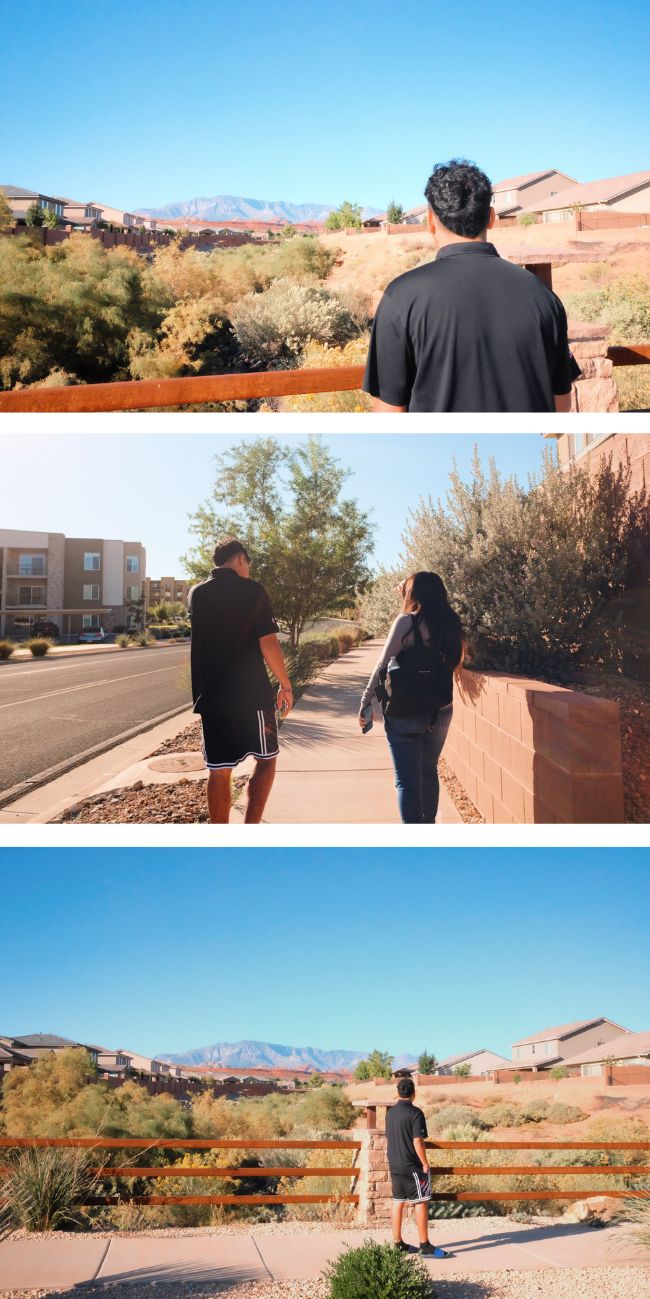Stories of Change

Miguel and his case worker Tania in his current city
Beyond Borders: Miguel’s Journey for Survival and Family
Story by: Jose Ruiz
Caseworker Tania Landi and Community Engagement Specialist Jose Ruiz recently traveled from New York City to meet with a client, referred to in this story by the pseudonym Miguel, to safeguard his privacy. Miguel’s story is a narrative emblematic of countless others navigating the web of migration’s challenges.
In a mountain-filled U.S. city, we met with Miguel, a teenager from Honduras. As we sat together admiring the beauty around us, Miguel recounted his story to us.
Miguel is from quaint village nestled in the heart of Honduras, where his world revolved around his family. His grandmother was paramount; she took responsibility for him after he was orphaned. You could see his eyes water as he talked about her. He explained, “She has severe diabetes. Her day-to-day life requires medical treatment, often something we can’t afford.” Miguel took the initiative to pay for her treatments, managing both school and work until it became untenable.
One day, he patiently waited for the school bus, but it never arrived. It turned out that the bus couldn’t follow its usual route because robbers were demanding exorbitant fees for the conductors to use that route. “I felt my opportunity for an education slipping away, like sand through my fingers,” Miguel explained. The only means for him to reach school was via the bus since walking through the dangerous roads daily was too risky.
The challenges in Miguel’s life seemed to multiply, and his family’s income could no longer sustain them. Miguel confronted a dilemma: remain in Honduras, navigating survival while supporting his grandmother, or relocate to the United States for a chance to improve their lives.
The decision was heart-wrenching, and the journey was an uphill battle.
Miguel traveled by coyote in a packed car with other migrants like him who sought a better life. “My legs were cramped, and my body was under immense pressure, I remained frozen in the same position for 15 hours at a time,” he recounted. “Eight of us crammed into a car meant for five, enduring the journey across Mexico,” he continued.
He arrived at the U.S.-Mexico border and was apprehended by border patrol, before being sent to a detention center near Hidalgo, Texas. “It all happened so quickly. I was not expecting that type of treatment. I think it was the worst part of the journey,” he said. The perpetual fluorescent lighting, unforgiving cold, thin aluminum blankets and the worm-infested food, Miguel found himself in the hieleras (freezers). He was placed with other afraid unaccompanied minors.
After two days, he was transferred to an Office of Refugee Resettlement shelter. There, caseworkers worked on connecting Miguel to a sponsor.
Miguel rested at a shelter for 48 days where he received support which included medical care, education, mental health assistance, food and recreational activities. Eventually, he was released and connected to his sponsor.
In the heart of the bustling city where his sponsor lived, Miguel found himself in a place that didn’t quite resonate with him. ”It was not my scene. I prefer a calmer environment,” he explained. He decided to move to a calmer U.S. city to be with his sponsor where he is hoping to start a GED program soon.
After getting to know Miguel at a deeper level, his love for his family and ambition was inspiring. He was a strong young man and through this strength, showed us his vulnerable side. Tania and I were grateful to listen to his story.
We sat there together, admiring the beautiful colors of the mountains, their stillness inviting reflection. I can’t help but ask myself, why do these children have to succumb to such situations? Why do these systems compel us to choose between love, peace, family and the fear of survival and hunger?
Finally, I asked, “What do you want your message to be for the people who read this story?”
“I want other unaccompanied children to know that even though life can be hard, we should be grateful for being alive and keep on fighting for a better future.”
Church World Service New York proudly serves unaccompanied children like Miguel. To learn more about how our caseworkers support unaccompanied minors, please visit our HSPRS page.
